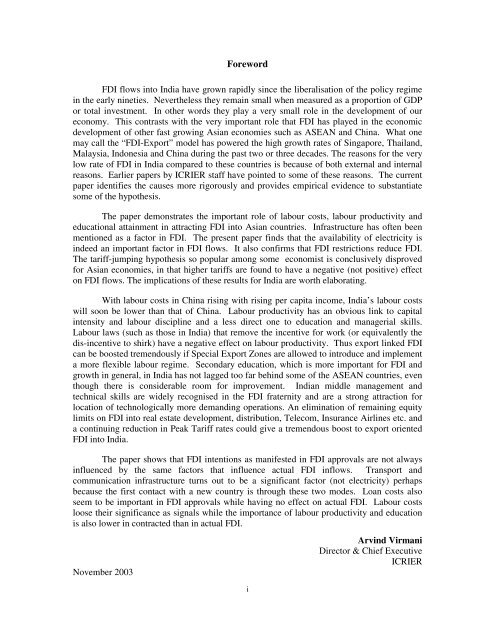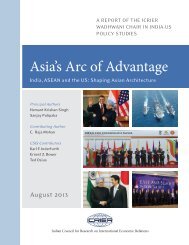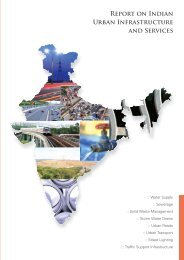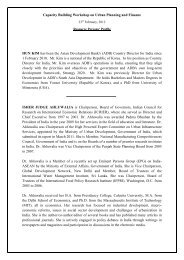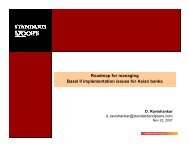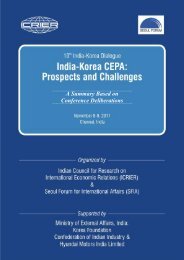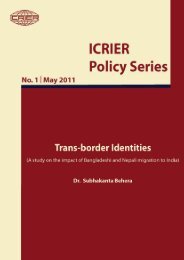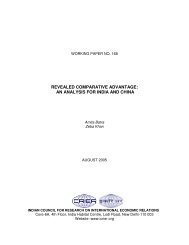impact of government policies and investment agreements on fdi ...
impact of government policies and investment agreements on fdi ...
impact of government policies and investment agreements on fdi ...
Create successful ePaper yourself
Turn your PDF publications into a flip-book with our unique Google optimized e-Paper software.
Foreword<br />
FDI flows into India have grown rapidly since the liberalisati<strong>on</strong> <str<strong>on</strong>g>of</str<strong>on</strong>g> the policy regime<br />
in the early nineties. Nevertheless they remain small when measured as a proporti<strong>on</strong> <str<strong>on</strong>g>of</str<strong>on</strong>g> GDP<br />
or total <str<strong>on</strong>g>investment</str<strong>on</strong>g>. In other words they play a very small role in the development <str<strong>on</strong>g>of</str<strong>on</strong>g> our<br />
ec<strong>on</strong>omy. This c<strong>on</strong>trasts with the very important role that FDI has played in the ec<strong>on</strong>omic<br />
development <str<strong>on</strong>g>of</str<strong>on</strong>g> other fast growing Asian ec<strong>on</strong>omies such as ASEAN <str<strong>on</strong>g>and</str<strong>on</strong>g> China. What <strong>on</strong>e<br />
may call the “FDI-Export” model has powered the high growth rates <str<strong>on</strong>g>of</str<strong>on</strong>g> Singapore, Thail<str<strong>on</strong>g>and</str<strong>on</strong>g>,<br />
Malaysia, Ind<strong>on</strong>esia <str<strong>on</strong>g>and</str<strong>on</strong>g> China during the past two or three decades. The reas<strong>on</strong>s for the very<br />
low rate <str<strong>on</strong>g>of</str<strong>on</strong>g> FDI in India compared to these countries is because <str<strong>on</strong>g>of</str<strong>on</strong>g> both external <str<strong>on</strong>g>and</str<strong>on</strong>g> internal<br />
reas<strong>on</strong>s. Earlier papers by ICRIER staff have pointed to some <str<strong>on</strong>g>of</str<strong>on</strong>g> these reas<strong>on</strong>s. The current<br />
paper identifies the causes more rigorously <str<strong>on</strong>g>and</str<strong>on</strong>g> provides empirical evidence to substantiate<br />
some <str<strong>on</strong>g>of</str<strong>on</strong>g> the hypothesis.<br />
The paper dem<strong>on</strong>strates the important role <str<strong>on</strong>g>of</str<strong>on</strong>g> labour costs, labour productivity <str<strong>on</strong>g>and</str<strong>on</strong>g><br />
educati<strong>on</strong>al attainment in attracting FDI into Asian countries. Infrastructure has <str<strong>on</strong>g>of</str<strong>on</strong>g>ten been<br />
menti<strong>on</strong>ed as a factor in FDI. The present paper finds that the availability <str<strong>on</strong>g>of</str<strong>on</strong>g> electricity is<br />
indeed an important factor in FDI flows. It also c<strong>on</strong>firms that FDI restricti<strong>on</strong>s reduce FDI.<br />
The tariff-jumping hypothesis so popular am<strong>on</strong>g some ec<strong>on</strong>omist is c<strong>on</strong>clusively disproved<br />
for Asian ec<strong>on</strong>omies, in that higher tariffs are found to have a negative (not positive) effect<br />
<strong>on</strong> FDI flows. The implicati<strong>on</strong>s <str<strong>on</strong>g>of</str<strong>on</strong>g> these results for India are worth elaborating.<br />
With labour costs in China rising with rising per capita income, India’s labour costs<br />
will so<strong>on</strong> be lower than that <str<strong>on</strong>g>of</str<strong>on</strong>g> China. Labour productivity has an obvious link to capital<br />
intensity <str<strong>on</strong>g>and</str<strong>on</strong>g> labour discipline <str<strong>on</strong>g>and</str<strong>on</strong>g> a less direct <strong>on</strong>e to educati<strong>on</strong> <str<strong>on</strong>g>and</str<strong>on</strong>g> managerial skills.<br />
Labour laws (such as those in India) that remove the incentive for work (or equivalently the<br />
dis-incentive to shirk) have a negative effect <strong>on</strong> labour productivity. Thus export linked FDI<br />
can be boosted tremendously if Special Export Z<strong>on</strong>es are allowed to introduce <str<strong>on</strong>g>and</str<strong>on</strong>g> implement<br />
a more flexible labour regime. Sec<strong>on</strong>dary educati<strong>on</strong>, which is more important for FDI <str<strong>on</strong>g>and</str<strong>on</strong>g><br />
growth in general, in India has not lagged too far behind some <str<strong>on</strong>g>of</str<strong>on</strong>g> the ASEAN countries, even<br />
though there is c<strong>on</strong>siderable room for improvement. Indian middle management <str<strong>on</strong>g>and</str<strong>on</strong>g><br />
technical skills are widely recognised in the FDI fraternity <str<strong>on</strong>g>and</str<strong>on</strong>g> are a str<strong>on</strong>g attracti<strong>on</strong> for<br />
locati<strong>on</strong> <str<strong>on</strong>g>of</str<strong>on</strong>g> technologically more dem<str<strong>on</strong>g>and</str<strong>on</strong>g>ing operati<strong>on</strong>s. An eliminati<strong>on</strong> <str<strong>on</strong>g>of</str<strong>on</strong>g> remaining equity<br />
limits <strong>on</strong> FDI into real estate development, distributi<strong>on</strong>, Telecom, Insurance Airlines etc. <str<strong>on</strong>g>and</str<strong>on</strong>g><br />
a c<strong>on</strong>tinuing reducti<strong>on</strong> in Peak Tariff rates could give a tremendous boost to export oriented<br />
FDI into India.<br />
The paper shows that FDI intenti<strong>on</strong>s as manifested in FDI approvals are not always<br />
influenced by the same factors that influence actual FDI inflows. Transport <str<strong>on</strong>g>and</str<strong>on</strong>g><br />
communicati<strong>on</strong> infrastructure turns out to be a significant factor (not electricity) perhaps<br />
because the first c<strong>on</strong>tact with a new country is through these two modes. Loan costs also<br />
seem to be important in FDI approvals while having no effect <strong>on</strong> actual FDI. Labour costs<br />
loose their significance as signals while the importance <str<strong>on</strong>g>of</str<strong>on</strong>g> labour productivity <str<strong>on</strong>g>and</str<strong>on</strong>g> educati<strong>on</strong><br />
is also lower in c<strong>on</strong>tracted than in actual FDI.<br />
November 2003<br />
Arvind Virmani<br />
Director & Chief Executive<br />
ICRIER<br />
i


